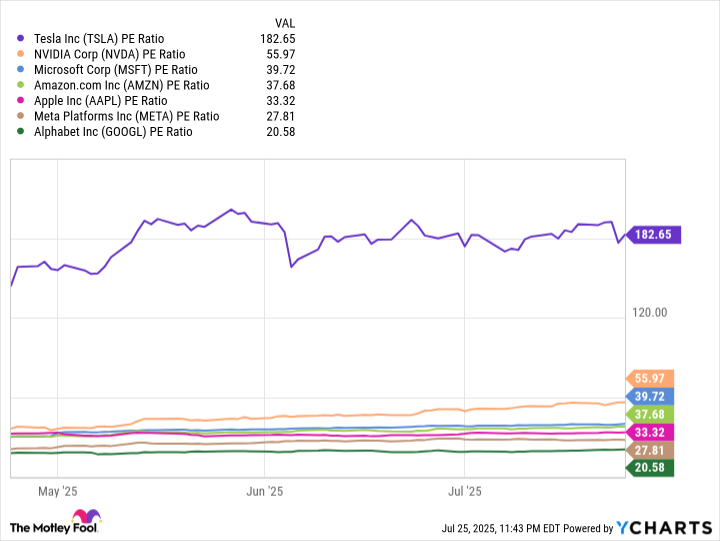The U.S. is home to nine companies with market capitalizations of $1 trillion or more, but only three have surpassed the ultra-exclusive $3 trillion milestone:
- Nvidia: $4.2 trillion
- Microsoft: $3.8 trillion
- Apple: $3.2 trillion
I think another might be set to join them. Alphabet (NASDAQ: GOOG) (GOOGL +1.72%) is the parent company of Google, and it's fast becoming a leader in the artificial intelligence (AI) race. The company had a market capitalization of $2.3 trillion as of market close on July 25, but its recent financial results and the valuation of its stock might support a move into the $3 trillion club in the near future.
If Alphabet does cross the exclusive milestone, investors who buy its stock today could earn a return of over 30%.

Image source: Alphabet.
AI is reshaping Google Search
Google Search is Alphabet's most important business, because it consistently represents more than half of the tech conglomerate's total revenue. A few years ago, investors were worried AI chatbots like OpenAI's ChatGPT would filter traffic away from Google Search, hampering its ability to generate revenue through advertising.
But it seems those concerns were overblown. Google Search generated a record $54.2 billion in revenue during the second quarter of 2025 (ended June 30), which was up 11.7% compared to the year-ago period. That marked an acceleration from its first-quarter growth of 9.8%, which suggests the search business is gathering momentum.
AI is a big reason why. Alphabet developed its own family of large language models (LLMs) called Gemini, and it used them to create a new Google Search feature called AI Overviews. They use text, images, and links to third-party sources to craft complete responses to queries, saving users from having to sift through web pages to find the information they need. This creates a far more convenient experience.
Alphabet said 2 billion people were using AI Overviews every month during the second quarter, and since they monetize at the same rate as traditional Google Search results, they aren't cannibalizing the company's core business. Overviews are also driving higher Google Search usage, because they encourage users to refine their queries to generate the most accurate outputs.
Alphabet also launched a stand-alone AI chatbot called Gemini to capture traffic from users who prefer to seek information that way. Moreover, the company just rolled out "AI Mode" for Google Search, which introduces a chatbot-style interface to the traditional search experience. Alphabet hopes these tools will keep users within Google's ecosystem, and stop them from experimenting with the competition.

NASDAQ: GOOGL
Key Data Points
Google Cloud revenue growth is also accelerating
Google Cloud is consistently Alphabet's fastest-growing business, and the second quarter was no exception. The segment generated a record $13.6 billion in revenue, which was up by a whopping 32% year over year. That marked an acceleration from the first quarter, when revenue grew by 28%.
AI is driving that momentum. Google Cloud operates industry-leading data centers fitted with powerful AI graphics processors (GPUs) from Nvidia, and also tensor processors (TPUs), which it designed in-house. This optionality makes the Google Cloud platform attractive to AI developers of all sizes, which is why nearly all AI unicorns (AI start-ups worth $1 billion or more) are using it.
Google Cloud also offers access to hundreds of ready-made LLMs, including Gemini, which developers can use to create AI software much faster than if they had to train their own models from scratch. Alphabet said more than 85,000 enterprises are now building AI applications with Gemini models, resulting in a staggering year-over-year increase in usage of 35 times during the second quarter.
Alphabet CFO Anat Ashkenazi said Google Cloud's order backlog soared 38% year over year to a whopping $106 billion, which means demand for computing capacity continues to outstrip supply. To convert that backlog into revenue, the company needs to build more data centers, which is why it just increased its capital expenditures (capex) forecast for 2025 to $85 billion, from $75 billion previously.
Alphabet's (mathematical) path to the $3 trillion club
Alphabet's earnings per share (EPS) climbed by 22% year over year in the second quarter to come in at $2.31. The company's trailing-12-month EPS now stands at $9.39, which places its stock at a price-to-earnings (P/E) ratio of 20.6.
That's a steep discount to the Nasdaq-100 technology index, which hosts all of Alphabet's big-tech peers, and trades at a P/E ratio of 32.5. It also makes Alphabet the cheapest stock in the "Magnificent Seven," a group of tech giants leading the way in different segments of the AI race.
Alphabet stock would have to soar by 83% just to trade in line with the median P/E ratio of the Magnificent Seven stocks (37.8), which would catapult its market cap to $4.2 trillion. Even if its stock climbed by 58% so its P/E matched that of the Nasdaq-100, it would still be enough to push the company's valuation way above $3 trillion.
One thing suppressing Alphabet's P/E ratio right now is the ongoing legal battle with the U.S. Department of Justice (DOJ). The agency won a lawsuit last year that determined Alphabet used monopolistic practices to protect its market share in the internet search industry. For example, the company was paying Apple handsome annual fees to make Google the default search engine on devices like the iPhone, making it nearly impossible for competitors to make inroads.
A judge is expected to hand down Alphabet's punishment in August. It could be a simple financial penalty, or the company might be forced to sell parts of its business to level the competitive playing field. Any remedy that diminishes the dominance of Google Search could harm Alphabet's earnings potential, which is why investors are tentative.
However, there is likely to be a lengthy appeals process, which could tie the matter up in court for several more years. In the here-and-now, I think Alphabet stock is a bargain based on its incredible progress in the AI space alone, especially as it relates to Google Cloud, which isn't facing regulatory scrutiny right now.
As a result, I think Alphabet has a pathway to the $3 trillion club in the next year or so, irrespective of the legal overhang.







